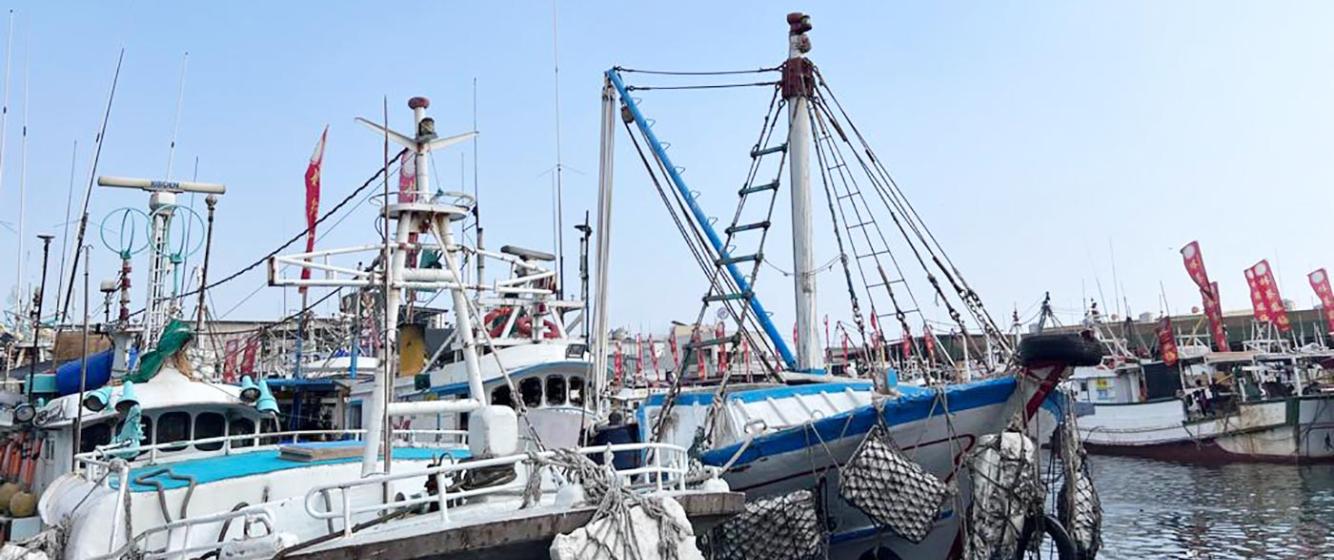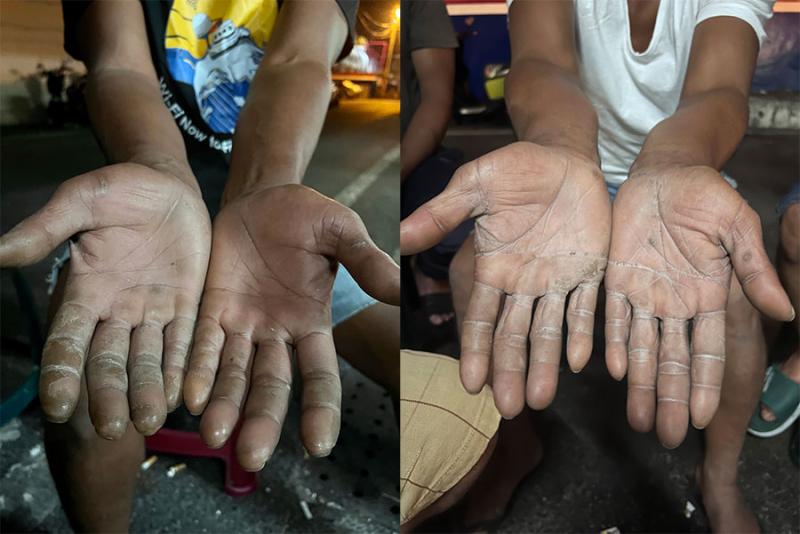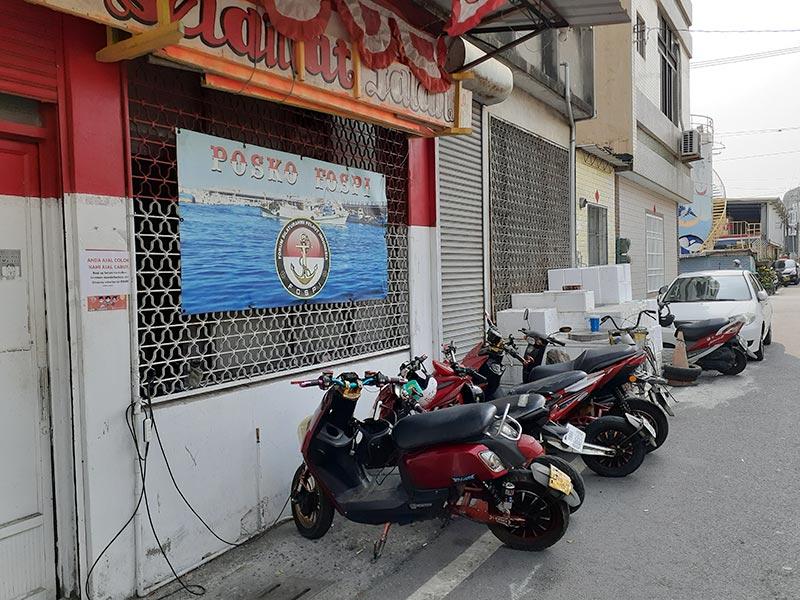
‘How come these Indonesian fishermen are going to Barcelona?’: Our WiFi campaign
The following narrative was constructed by Isabelle Cockel, based on an interview that she conducted with Jonathan S. Parhusip, an Indonesian Ph.D. student of National Yang Ming Chiao Tung University and a Seafood Campaigner for Global Labour Justice-International Labour Rights Forum. The interview was conducted on 17 April 2023 before Parhusip went to Barcelona for their WiFi campaign.
To campaign for allowing migrant fishers hired by Taiwanese vessels to use WiFi on the high seas, I am going to Barcelona with Indonesian fishers for the Global Seafood Market Place on 25-27 April. Applying for a Schengen visa with an Indonesian passport is so difficult! The difficulty actually began with getting their Taiwanese bosses’ permission to leave their job. Then they had to secure their permission from the Taiwanese government to return to Taiwan. This is because although migrant workers legally reside in Taiwan, they cannot freely depart and return to the island. Their brokering agency has to apply for a re-entry permit to the National Immigration Agency on their behalf. Afterwards, to apply for a Schengen visa, they had to submit a formal invitation from the organiser of the Global Seafood Expo together with a proof of their financial sufficiency. When I submitted their documents (flight tickets, hotel bookings, and travel itineraries) to the Taiwanese brokering agency, the agency staff were startled: How on earth are these Indonesian fishermen going to Barcelona?!
This is actually our second foreign visit after we made it in March 2023 to Boston for the North American Seafood Expo. We had gone through a similar visa application frenzy in Jakarta. We had only 2-3 days to get all the documents ready and had only one day for US visa application interviews for two Indonesian men who used to be fishers hired by Taiwanese vessels. The two men were so ill-prepared for the winter in the United States – they boarded the plane to Boston in long-sleeved T-shirts and flipflops! We grabbed the blankets given by the airline before we got off the plane.
Before we set foot on the US soil, we had been working very hard in Taiwan. In November 2022 and February 2023, we had meetings with the Fisheries Agency, the Council of Agriculture, the Ministry of Labour, the Ministry of Digital Affairs, the National Human Rights Commission, the Minister without Portfolio, and several legislators, in addition to our meetings with the Taiwan Tuna Association and the Squid and Saury Association. Indonesian fishers from Donggang, a major fishing port in southern Taiwan, represented Forum Silaturahmi Pelaut Indonesia (Indonesian Seafarers Gathering Forum, FOSPI) at these meetings. Their free time was limited, but they wanted to be there speaking for themselves. Their presence overturned the power dynamics at these official meetings. “I was at sea for 11 months and throughout these 11 months, I couldn’t talk to my family,” they said of their own experiences. No officials, civil servants, or industry representatives in front of them could make any more excuses to justify the denial of this basic human comfort to them.
Without these fishers, in the past, at similar meetings, our demands seemed to have fallen on deaf ears. The Taiwanese government used to dismiss our demands, claiming that it is not obligatory for the state to ensure migrant workers’ access to communication, but such a refusal is against the C188 Work in Fishing Industry Convention. Moderated from this outright rejection, the Taiwanese government now argued that it has adopted a new regulation since December 2022, whereby tuna or squid longliners above 20 tons may apply for public funding to install WiFi facilities enabled by satellite technologies and such vessel owners are eligible for public funding to pay for the monthly charge up to 12 months. With this in place, the government argued that fishers on such vessels have access to WiFi. True, but for how long? Five minutes every week per person for the crews on these vessels, as stipulated by the regulation. Yet, whether this meagre provision can be enforced remains to be seen.
Taiwan is the second largest seafood provider in the world, second only to China. It can follow the good example of the fishing authorities in the Falkland Islands, who do not allow vessels to operate in its waters if they are not equipped with WiFi facilities. China, Taiwan’s competitor, has installed WiFi on a big number of its vessels, but the Taiwanese government argued that this is motivated by the interest of engaging in espionage activities in the South China Sea. Big players in the Taiwanese fishing industry did not deny that satellite-enabled WiFi is available and affordable, but they delegate the management of their vessels to subcontractors, and the subcontractors may not reinforce the regulations as adopted by the government. And the working conditions on fishing vessels also vary from sector to sector. Stella Maris Kaohsiung conducted its own survey on 40 squid jigger vessels and found that 80 per cent of these vessels have WiFi facilities, but only half of them are accessible for the crews. The remaining are only given to the ranked officers or masters onboard the vessel. As for those smaller vessels moored in Donggang, the owners continued to argue that the cost is so high that they cannot afford it and that they would not make profit if they are forced to install WiFi facilities.
The Indonesian fishers representing FOSPI wanted to participate in these meetings. In fact, ensuring their presence at these meetings has become a new strategy for our campaign. At Stella Maris Kaohsiung, we ran a workshop to mobilise Indonesian fishers to fight for their rights, but we know that fishers were also concerned with whether there would be repercussions or retaliation against them. After all, it is they who, in isolation, face the power and authority of the Taiwanese captain. The captain is a master of deploying the ‘divide-and-rule’ strategy to ensure his crew’s obedience. This strategy is partly enabled by the hierarchy amongst crew members. Under the Taiwanese captain, Taiwanese ratings in the engine department are higher than those of foreign fishers who do manual work. The Taiwanese ratings are known as ‘leads,’ and crew members fight for the favour of these Taiwanese leads. When the crew comprises a multi-national team, including Indonesian, Vietnamese, and Chinese, then there are ‘leads’ in each nationality group. The Taiwanese captain and ratings in the engine department also make sure these nationality groups are in suspicion of each other. There is no solidarity across nationality. It is not hard to see how this hierarchy and the ‘every man for himself’ mentality become susceptible to problems, and the mysterious death of Supriyanto in 2015 on a Taiwanese vessel is a good example!
To solve these problems, partly also caused by the language barrier between the Taiwanese captain and his foreign crew, Taiwan Tuna Association and Squid and Saury Association signed an MoU with the Indonesia Fisheries Worker Union (Serikat Pekerja Perikanan Indonesia, SPPI), a labour union in Indonesia, so that SPPI can mediate between Taiwanese employers and Indonesian fishers. Such mediation is necessary because the employers are concerned with the fishers’ collective actions, which are described by the employers as going on strike. To the employers, going on strike is illegal, and a strike means a loss of profit. In this context, the MoU asks the Indonesia-based labour union to talk to the crew about their problems. If Indonesian fishers are connected with WiFi, then the Indonesian labour union can talk to both sides whenever issues arise and improve their communication.
But the Taiwanese fishing industry has continuously blamed the unavailability of WiFi on its high cost. The installation of satellite-enabled WiFi facilities costs around US 8,000 dollars and the monthly rent is around US 500 dollars. Humanity Research Consultancy (HRC) interviewed WiFi operators and found that the latter was very interested in exploring this market. The Ministry of Digital Affairs supported our campaign, arguing that satellite-enabled internet connection is the future, as shown by the improvement of Star Link. Using public funds to support this ‘next-generation’ technology for the fishing industry can boost the growth of the WiFi sector, which will be beneficial for the Taiwanese economy in the long run. Taiwan is proud of providing ‘universal’ healthcare for its citizens and foreign nationals, and Taiwan is a leading nation for digital technologies. Why can’t it also make WiFi connection ‘universally’ available for its employees regardless of their vocations? Giving away the normality of a land-based life to the hardship at sea is a risk undertaken by fishermen, and their vocation leaves deep marks on their body. When I was a Master’s degree student, I joined a group of Taiwanese students in the North Coast of Java, and we organised an exhibition of fishermen’s hands. In the pictures taken by us, thick calluses and horizontal cuts appeared on their fingers and palms after many years of pulling the ropes at their job. This is a price they paid to work in this unforgiving industry.

Indonesian fisher’s hands
I know that fishermen are worried about taking part in this campaign. So, for our visit to Boston in March 2023, we included a former deputy FOSPI chair to advocate for their own benefit. They spoke very well about the problems. In Boston, we met Thea Lee, Deputy Undersecretary for International Labour Affairs of the Department of Labour, who not only mentioned us in her speech given at the event, but also mentioned our meeting in her tweet. A side meeting held by us was attended by the National Oceanic and Atmospheric Administration (NOAA) of the US State Department, Greenpeace, big businesses (e.g., Bumble Bee, StarKist), and many more US-based NGOs and labour unions. From Boston, we went to Washington D.C. and visited the US Trade Representative (USTR), the Office to Monitor and Combat Trafficking in Person, the Bureau of International Labour Affairs, and several congressmen. We wanted our demand to be included into the U.S.-Taiwan Initiative on 21st Century Trade. After our meetings in the United States, AFL-CIO (the American Federation of Labour and Congress of Industrial Organizations) representatives came to Taiwan, visited FOSPI in Donggang, and met Taiwanese NGOs, including the Taiwan Association for Human Rights (TAHR) and Serve the People Association (SAP), both of whom also joined our WiFi campaign.

FOSPI Office in Donggang
All of these efforts have not gone unnoticed – we are invited to go to Barcelona for the Global Seafood Market Place exhibition. Centring on migrant fishermen, our campaign is facilitated by a coalition of INGOs (Global Labour Justice-International Labour Rights Forum and HRC), Taiwanese NGOs (TAHR, SPA, Stella Maris Kaohsiung), and migrants’ self-help organisations such as FOSPI. I have learned a great lesson from our experiences: campaigns will not succeed if we deviate from migrants’ own voices. INGOs who adopt a confrontational approach may grab the media’s attention, but it may set the fishers in a difficult position; the image projected by INGOs may not be agreed with by the fishers themselves. So, they have to be their own advocates, and they have to be present at our meetings. We also need to keep our own account of the meetings and make these records available. This can also take the government accountable.
Our message to the Taiwanese government is simple: why don’t you make yourself a model to be followed by other states? The current premier is an academic and devout catholic. We hope he will listen to our message.
Add new comment